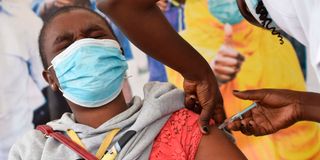Don't drop your guard yet, experts warn as Covid enters third year

A woman receives Covid-19 vaccination at Dagoretti Deputy County Commissioner's offices in Nairobi during the launch of mass vaccination on February 3,2022.
As the Covid-19 pandemic enters its third year in the country, it has been a distressing journey for many who lost their loved ones to the virus.
Ms Millicent Nyaboke, who is still struggling to come to terms with the loss of her mother, tells the Nation that it has been very difficult settling down with her mother.
“I was the only child to my mother. I lost her in May 2021 to Covid-19 after a week of being diagnosed with Covid and all I was left with was the hospital bill being the only child, I am still struggling to clear the bill,” she said
She adds: “If there is one thing that Covid-19 taught me is to appreciate your loved ones when they are still alive. I have no siblings and at times, I feel very lonely.”
Cumulatively, the country has lost 5,688 Kenyans to the virus since it was reported three years ago, on March 13, 2020, with the country recording over 350,000 cases. Over 4 million tests have been conducted.
Over the past three years, about 23 million doses of the vaccine have been administered across the country, about 19 million of those given to adults accounting for 37 per cent.
This means that out of 10 people, only four are fully vaccinated with another 3 million doses given to children aged 12 to under 18.
The number of booster doses has increased to 1.7 million. The country purchased and received 27.8 million doses from donors in 2021.
This means there are about four million doses in the country waiting to be utilised. In March, the Ministry of Health was compelled to destroy 840,000 AstraZeneca vaccine doses following their expiry.
The country reported the first case of Covid-19 in March 2020, after a Kenyan resident travelled to Nairobi from the United States via London.
Dr Andrew Mulwa, Director of Medical Services Head Directorate Preventive and Promotive says the number of cases has gone and for the last week, no case has been reported pointing out that the virus is no longer an issue.
“Pandemic is no longer an issue, the numbers have gone down though we are doing surveillance and monitoring, nothing is significant,” Dr Mulwa said.
Today, incidence rates are 30 times lower than a year ago, but “while we are not totally out of the woods, we are in a much better place.
"We're talking about the three-year anniversary," he said. "In the coming years, we will still be talking about it. Just mask up if you can. The virus is here to stay.”
Dr Mulwa said in as much as testing for the virus has gone down, it is still available by use of rapid testing kits where available and it is crucial to maintain and continue with surveillance since the virus evolves and adapts quickly.
“We still need to go for the test and ensure that you are vaccinated because the test and vaccines are available yet no one is going for them,” he said
Last week, the Nation learnt that about a million doses of Covid-19 vaccines may expire in the coming months as Kenyans shun them. Many countries are destroying hundreds of thousands of expired and unused Covid-19 vaccine doses.
Also read: Is Africa ready for the next pandemic?
According to a report released by the Lancet journal marking three years, it indicated that as the world moves on from the pandemic, at least 65 million people are estimated to struggle with long Covid including cognitive dysfunction, impairing their ability to perform daily activities for several months or years.
Although the majority of patients infected with SARS-CoV-2 recover within a few weeks, long Covid is estimated to occur in 10–20 per cent of cases and affects people of all ages, including children, with most cases occurring in patients with mild acute illness.
“I know we have people still struggling with long Covid, this should be a motivator for many to have their jab,” Dr Mulwa said.
Kenya Medical Practitioners and Dentists Union Deputy Secretary Dennis Miskellah asked Kenyans to get vaccinated since the virus is still here. The earlier they take the vaccine the better before another wave outbreak.
Prof Omu Anzala, in the Department of Medical Microbiology at the University of Nairobi, said that there is a need for serious dialogue with all healthcare professionals, communities, opinion leaders and policymakers on vaccine hesitancy and the danger in the population.
“We need to tell people the importance of the vaccine and why they should be taking it,” Dr Anzala said.




